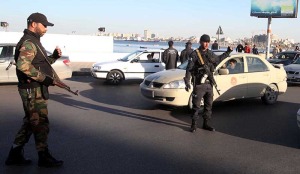
Almost immediately, all the media reported that the cause of the incident was the killing of a Libyan officer by a Russian, Ekaterina Ustyuzhaninova on the previous day. In addition, she stabbed his mother with a knife. And she wrote on the fence of the dead man’s home the word “rats” in blood. So the angry relatives decided to avenge the killing. And they turned out to be almost 100 people. Is this not strange? And what does the Russian Embassy have to do with all this?
It is clear that the situation was not so simple. It is no coincidence that on the morning of October 3, Russian Foreign Minister Sergey Lavrov accused the Libyan government of failing to protect the embassy, and already after midday, almost all the Russian diplomats and Russian citizens left Tripoli for neighboring Tunisia.
The head of the interim government of Libya, Ali Zidan, and Minister of Foreign Affairs and International Cooperation Mohamed Abdelaziz visited the Russian embassy almost immediately after the attack. They assessed the damage, and Zidane “expressed his gratitude to the citizens and the security agencies for their help … and defense of the embassy”. In reality, there was no defense, as the attackers managed to enter the embassy grounds. The Russian diplomats were just lucky that the attackers limited their actions to vandalism.
This is not the first attack on the Russian Embassy in Libya. In February 2012, a group of angry Syrians attacked the building in protest for the blocking by Russia of the anti-Assad resolutions at the UN Security Council. The demonstrators raised the Syrian opposition flag over the residence of the Russian ambassador and shouted anti-Russian slogans. It is logical to assume that this time the protests were also of a political nature, what’s more, several local bloggers wrote about this. And other sources say that the information about the “Russian woman” is unconfirmed, and it could be a “Ukrainian or a Serbian”. But the woman was arrested and the authorities are investigating.
We must understand clearly that in Libya there are forces that want to take advantage of this domestic homicide, if this was really the reason for an attack. But there are other versions. One of them is that it was committed by al-Qaeda insurgents. A second is that there are different clan groups in Libya itself, where a fierce war is taking place between disparate political forces. On the one hand – the pro-Western, and on the other – those with pro-Islamic sentiments. And among the latter, al-Qaeda is not very popular, especially due to its relationship with Qatar, which not only funded the Libyan Islamic radicals in the war against Gaddafi, but which continued to provide generous assistance after the overthrow of the colonel and his barbarous murder before the eyes of the civilized world.
One can not exclude the possibility that the attack is a reflection of this political struggle, when someone is trying to get ahead with the “Russia – out of Libya” slogan. Moreover, the current leadership of Libya has already started to talk of reconciliation with the supporters of Gaddafi, reconciliation with Russia, to grant Russia a large number of contracts, especially where there would be continuity with technological operations. Perhaps this is an attempt to influence the current government. The fact that the Libyan authorities are beginning to look to Russia in a positive light is reinforced by the cancellation by the Libyan highest military court of the August 14 sentences of Russians Alexander Shadrov and Vladimir Dolgov, who were sentenced to life imprisonment and 10 years in prison, respectively, for “the support of the Gaddafi regime”. This is a great achievement for the Russian Foreign Ministry. The Russians’ case has been referred to the civil court (not military, as before), and the official status of the Russians has been changed from “convicted” to “detainees”. The Libyan Prosecutor General’s Office must now decide whether to support the charges made by the military or to reclassify the case.
But there is a third option, a provocation organized by the special services of Qatar and Saudi Arabia, who are unhappy with start of the normalization process in relations between Moscow and Tripoli, and even more so – the principled position of Russia in defending Syria. Especially given that Saudi “fingerprints” have been found all over the provocative use of chemical weapons in Syria, which was then blamed on Damascus and even Moscow, even though all evidence leads to the Saudi Prince Bandar and his American friends in the form of Republican hawks such as John McCain, who arranged the fabrication with sarin using Syrian rebels.
Viktor Titov, Ph.D. (Candidate of Historical Sciences), is a political commentator on the Middle East. Exclusively for the New Eastern Outlook online magazine.
